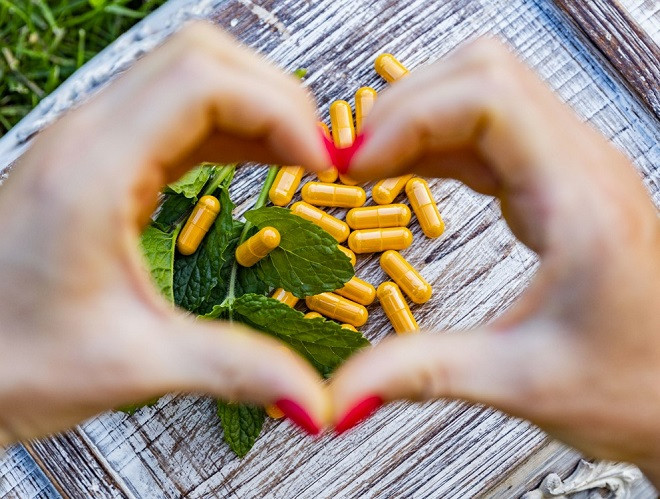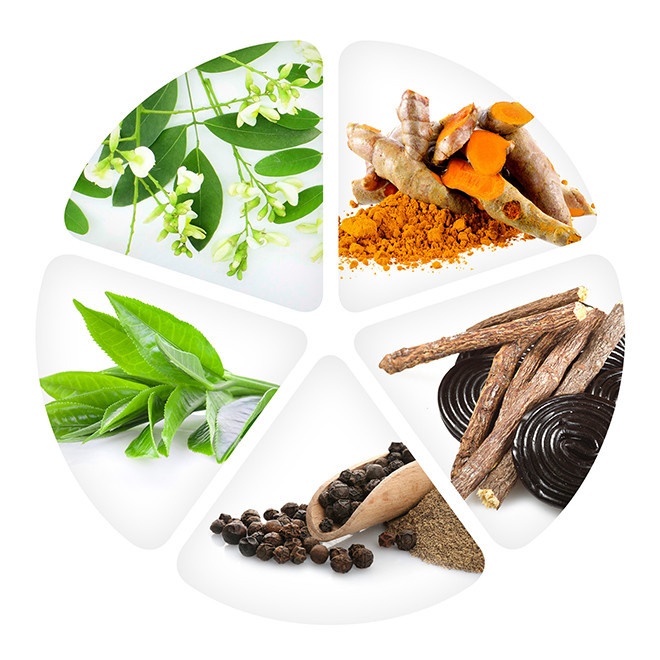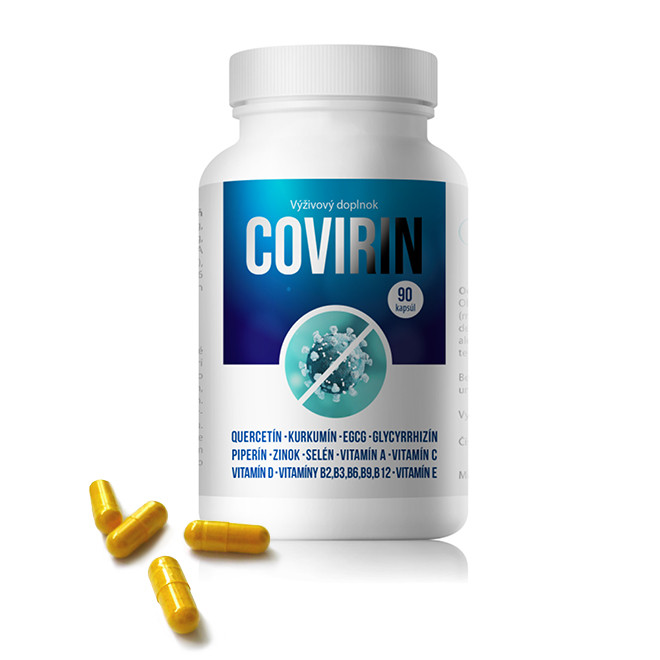Každý balíček s objednávkou od 8.3.2024 z e-shopu, ukrýva v sebe i prekvapenie, aby ste kvitli do krásy nielen zvnútra, ale i navonok.
 Bez laktózy
Bez laktózy Bez lepku
Bez lepku Bez konzervancií
Bez konzervancií GMP štandard
GMP štandard
 Slovenský výrobok
Slovenský výrobok
 Vyrobené v EÚ
Vyrobené v EÚ
Viete ako vznikol
COVIRIN?
Ktoré zložky obsahuje? Pre koho je určený a ako funguje?
V čom spočívajú jeho výhody a jedinečnosť?
Odpovede na vaše otázky a užitočné informácie nájdete v článkoch dolu, ktoré o COVIRINe publikovali vybrané slovenské média...
Slovenský doplnok výživy na "imunitu" si našiel tisíce užívateľov | Pravda.sk
Unikátna slovenská kapsula na podporu imunity | Nový Čas (cas.sk)
Nemohol sa pozerať, ako jeho manželka trpí | Zdravie.sk
Slovenský unikát na imunitu. Za vznik môže chorá manželka | Topky.sk
Covirin: Unikátna slovenská kapsula na podporu imunity | Woman.sk
COVIRIN môže byť vhodný na komplexnú podporu imunity u tých, ktorí:
COVIRIN obsahuje 16 zložiek, ktoré vzájomne spolupracujú a dopĺňajú sa pre komplexnú podporu vašej imunity (obranyschopnosti).


COVIRIN je vyživový doplnok s vysokým obsahom rastlinných extraktov (quercetín, kurkumín, polyfenoly zeleného čaju s obsahom epigalokatechín galátu (EGCG), glycyrizín, piperín), minerálov (zinok, selén) a vitamínov A, B2, B3, B6, B9, B12, C, D a E vo forme kapsúl.
Vybrané aktívne zložky v COVIRINe prispievajú k správnemu fungovaniu imunitného systému, zachovaniu zdravých slizníc, ochrane buniek pred oxidačným stresom a zníženiu vyčerpania a únavy*.
*Zoznam zdravotných tvrdení, ktoré možno uvádzať na potravinách podľa článku 13 ods. 3 nariadenia (ES) č. 1924/2006
Obvyklá denná dávka pre dospelých je 1 kapsula 2x denne (2 kapsuly/deň) s jedlom alebo po jedle zapiť s dostatočným množstvom tekutiny. V prípade zvýšenej potreby zvoľte maximálnu dennú dávku 2 kapsuly
2x denne (4 kapsuly/deň). Neužívajte nalačno!
COVIRIN nie je liek, nenahrádza úlohu liekov a preto nie je určený na diagnostiku, liečbu, vyliečenie alebo prevenciu akéhokoľvek ochorenia.
Prípravok nie je určený pre deti, tehotné a dojčiace ženy. Uchovávajte na suchom mieste pri teplote do 25 °C, v dobre uzatvorenom obale, mimo dosahu malých detí. Výrobok chráňte pred mrazom, priamym slnečným žiarením a sálavým teplom. Ustanovená odporúčaná denná dávka sa nesmie presiahnuť. COVIRIN možno užívať aj dlhodobo. Ak užívate lieky, poraďte sa so svojím lekárom. Všeobecne je odporúčané užívať COVIRIN a lieky s odstupom minimálne 3 hodiny. Výživový doplnok sa nesmie používať ako náhrada rozmanitej stravy.
Originálny prípravok COVIRIN je bez laktózy, lepku, konzervancií, geneticky modifikovaných surovín (non-GMO), umelých sladidiel a farbív.
Obsah balenia: 90 kapsúl
Čas minimálnej trvanlivosti: 2 roky.
Vyvinuté a vyrobené na Slovensku.
One Pharma COVIRIN® je registrovaná ochranná známka, na ktorú má výlučné právo One Pharma, s.r.o., Slovensko.

"Som veľmi rada, že môžem s One Pharma spolupracovať. Vždy som sa snažila so cťou reprezentovať Slovensko na medzinárodnej scéne.
Ako vrcholový športovec sa často potýkam so zníženou imunitou v dôsledku extrémnej záťaže organizmu. Hľadala som produkt, o ktorý sa môžem skutočne oprieť. Produkt, ktorý podporuje imunitu a zároveň pomáha s ľahkosťou prekonávať akýkoľvek nachladnutie či oslabenie organizmu. V dobe, keď som potrebovala podávať 100% výkon a byť v plnej kondícii sa stal COVIRIN neoddeliteľnou súčasťou môjho športového sveta. Verím, že i vďaka nemu som si súťažnú sezónu doslova užila.
Oceňujem profesionalitu a prístup pri launchovaní každého produktu, ktorý výchádza z dielne One Pharma. Zaručuje vždy dôkladnú prípravu, výskum i unikátne zloženie, ktoré na trhu nemá konkurenta.“


◌●◌●◌
quercetín dihydrát ≥ 95% extrakt (Sophora Japonica L.)
kurkumín extrakt (Curcuma Longa L.) s ≥ 95% obsahom kurkuminoidov (kurkumín, demetoxykurkumín, bisdemetoxykurkumín)
extrakt zo zeleného čaju (Camellia Sinensis L.) – dekofeínovaný, s obsahom ≥ 98% celkových polyfenolov, ≥ 80% katechínov a ≥ 50% epigalokatechín galátu (EGCG)
glycyrizín (glycyrizinát disodný, extrakt z lekorice/sladkého drievka - Glycyrrhiza glabra L.)
piperín ≥ 95% extrakt z čierneho korenia (Piper Nigrum L.)
zinok (citrát zinočnatý)
selén (seleničitan sodný)
vitamín A (retinol acetát)
vitamín B2 (riboflavín)
vitamín B3 (niacínamid)
vitamín B6 (pyridoxín hydrochlorid)
vitamín B9 (kyselina listová)
vitamín B12 (kyanokobalamín)
vitamín C (askorban sodný)
vitamín D3 (cholekalciferol)
vitamín E (d-alfa-tokoferol acetát)
HPMC celulóza, kapsuly rastlinného pôvodu z celulózy
2 kapsuly obsahujú: quercetín 250 mg, kurkumín 200 mg, polyfenoly zeleného čaju 200 mg, glycyrizín 30 mg, piperín 6 mg, zinok 16 mg, selén 60 μg, vitamín A 1000 μg (3333 IU), vitamín C 360 mg, vitamín D3 50 μg (2000 IU), vitamín B2 1,5 mg, vitamín B3 24 mg, vitamín B6 1,5 mg, vitamín B9 (kys. listová) 300 μg, vitamín B12 2,5 μg, vitamín E 13 mg.
4 kapsuly obsahujú: quercetín 500 mg, kurkumín 400 mg, polyfenoly zeleného čaju 400 mg, glycyrizín 60 mg, piperín 12 mg, zinok 32 mg, selén 120 μg, vitamín A 2000 μg (6667 IU), vitamín C 720 mg, vitamín D3 100 μg (4000 IU), vitamín B2 3 mg, vitamín B3 48 mg, vitamín B6 3 mg, vitamín B9 (kys. listová) 600 μg, vitamín B12 5 μg, vitamín E 26 mg.
COVIRIN je veľmi kvalitný produkt, ktorý užívame celá rodina. Dokonca aj v alergoimunologickom centre nám ho lekárka vrelo odporúčala ako doplnok ku liečbe. Celé jesenné a zimné obdobie sme boli úplne zdraví, nemali sme žiadne ochorenia. Oceňujem aj vedenie firmy, v prípade nejakých nejasností ohľadom užívania konkrétnych produktov, kompletne zodpovedajú na otázky. Absolútne profesionálny, vysoko odborný a rýchly prístup. Za mňa veľká vďaka.
Michaela B.
10.04.2024
Herpes complex a Covirin sú vynikajúce a účinné produkty s ktorými sme veľmi spokojní.
Silvia S.
04.04.2024
Na odporučenie mojej doktorky si zakúpiť vitamíny na podporu mojej imunity som ihneď u vás objednala Covirin 90 a to hneď 2krát, ďakujem a odporúčam všetkým starším ľudom aby si to zakúpili
Mária S.
28.03.2024
COVIRIN - výborná kombinácia viacerých vitamínov
Elena S.
20.03.2024
COVIRIN mi odporučila moja pani doktorka, ktorej plne dôverujem. Od kedy ho užívam som nebola chorá, ani počas chrípkovej sezóny. Ďakujem!
Kristína C.
18.03.2024
Richard V.
13.03.2024
S produktom COVIRIN som spokojná - pomáha.
Martina Č.
11.03.2024
Ďakujeme pekne s manželkou za možnost použivat Covirin vo veku 83 rokov pomáha k dennému životu vyplnenú cvičenim prechádzkami prácami v dome a záhrade doporučujeme priateľom a tešime sa zo života prosím je to odpoveď pre Väs
Jozef H.
03.03.2024
Veľký pomocník pri chrípkových stavoch, dokonca v minulosti aj pri Covide , ľahký priebeh, a veľmi rýchlo prešli bolesti svalstva a kĺbov.
Marta S.
02.03.2024
Kapsule Covirin som začala užívať, keď som mala Covid na doporučenie svojho lekára. Zostala som im verná aj naďalej a pravidelne si ich kupujem a užívam. Covidom som prešla v pohode.
Alexandra .
01.03.2024
Produkty tejto spolocnosti kupujem uz 3 roky. Zaciatkom roka 2020, kedy som absovloval dost neprijemny priebeh Covid ochorenia, nastastie s dobrym koncom svojpomocne, a preto som sa rozhodol nieco s tym spravit, aby som svoje telo doplnil tym, co zrejme chyba obrovskej populacii ludi v dnesnej dobe. Kedze moc produktov dostupnych nebolo na trhu, ktore by poskytovali dostatocnu imunitnu podporu organizmu v tom case a nemal som zaujem uzivat rozne kombinacie vitaminov od roznych vyrobcov, narazil som na tento skvely produkt ktory kombinaciou vsetkych potrebnych vitaminov v jednom zahrnal presne to co som potreboval. Dany produkt obsahuje vsetky najpotrebnejsie vitaminy v potrebnych davkach pre cloveka v jendom, povedal som si ze produkt vyskusam a dobre som urobil. Od 03/2020 som v podstate nemal respiracne ochorenie, dokonca mi ustupili aj casto vyskytovane herpes simplex, ktore som v jarnom obdobi casto maval. Urcite toto treba vyskusat, samozrejme uzivat to v case uz prebiehajucej chripky moc nepomoze, telo treba pripravit na doplnenie chybajuch vitaminov vcas dopredu aspon 2-3-4 mesiace. Mam zauzivane pravidlo tak, ze niekedy na jesen prelom september oktober uzivam prve dva tyzdne 2-0-2, a po tejto dobe prejdem na uzivanie 1-0-1 az do konca marca. Je to cca 6 mesiacov uzivania na co postacuje balenie 4*90tbl. Teraz v case pisania prispevku je cena takmer o 1/3 nizsia ako v minulosti, takze zasobu sa urcite oplati urobit. V letnych mesiacoch je telo vystavene dostatocnemu prisunu vitaminu D, a roznych inych vitaminov vdaka sezonne dostupnemu ovovciu a zeleniny, preto mam ja osobne v tomto obdobi pauzu :) Je to na kazdom z nas ako sa kto rozhodne, ja som produkt odporucal viacerym ludom, ako sa rozhodli v tom zotrvat uz je na nich, ja v tomto planujem pokracovat aj nasledujuce roky. Zelam vsetkym pevne zdravie vela sil a tejto spolocnosti to, aby neprestavali udrzovat trend aky zacali. Ste skveli a za mna a nas velke DAKUJEM. p.s.: na internete ako i tu na tomto webe su dostupne clanky, ktore popisuju pribeh ako tento unikat vznikol :)
Marcel M.
23.02.2024
Overená komplexná podpora imunity = spokojný zákazník...
Miloš S.
17.02.2024
Som s týmto výrobkom spokojná užívam ho už asi 3.zimu od jesene do jari ako prevenciu proti virózam.
Aneta K.
13.02.2024
Som veľmi spokojná s výrobkom a užívam covirin ????????
Dominika P.
13.02.2024
Manžel dostal v 11/2023 COVID, takže jeho imunita potrebovala podporu. Objednali sme Covirin na zlepšenie imunity a môžem posúdiť, že lepšie odoláva súčasným chrípkovým vírusom.
Zuzana L.
13.02.2024
Covirin užívame celá rodina už 3 zimné obdobia, od októbra do marca. Chrípka a podobné neduhy sa nám vyhýbajú. Manželovi sa neobjavuje ani herpes.
Alžbeta R.
12.02.2024
***** ku každej výrusovej chorobe.
Štefan H.
12.02.2024
Užívam Covirin dlhodobo, od Covidu, liečil som ním aj syna, lebo lekári na Slovensku boli zapredaný Pfizeru, to znamená neliečiť, ale očkovať a posielať vlastných ľudí na druhý svet, príkladov a skúseností okolo mňa viac ako dosť. Váš produkt pravidelne užívame celá rodina od jesene do leta, myslím, že to má účinok, tento rok sa mi zatiaĺ vyhýbajú respiračné choroby. Ďakujem za pomoc, ktorú odmietli naši lekári.
Bohumil H.
11.02.2024
S OnePharma mám velmi dobre skúsenosti viac ako dva roky. Objednávam pravidelne Covirin pre moju rodinu celé obdobie , kedy sa vírom dobre darí. S Covirinom sa nám darí udržiavať nás imunitný systém v dobrej kondícii . Mnohí naši priatelia začali Covirin tiež užívať na naše odporučenie ale hlavne keď videli, aké s ním ma nasa rodina dobre skúsenosti v denno dennom zivote .Vďaka za tento produkt.Prajem One Pharma veľa úspechov !
Bohumil H.
05.02.2024
Produkt som zakupil na zaklade recenzie od znamej ktora bola zdrava aj ked jej okolie bolo choré. Ocenujem slovenský výrobok aj firmu . S produktom som zatial velmi spokojny
Jarosalv H.
05.02.2024
Produkt som zakupil na zaklade recenzie od znamej ktora bola zdrava aj ked jej okolie bolo choré. Ocenujem slovenský výrobok aj firmu . S produktom som zatial velmi spokojny
Jaroslav h.
03.02.2024
Dobrý deň prajem, tabletky Coviri na imunitu sú super. užívam ich 2 roky a podpora imunity je lepšia. Dd vtedy čo beriem Covirin nebol som chorý
Ján B.
01.02.2024
Covirin od OnePharma je pre mňa záruka, že nezabudneme na žiadne vitamíny. Kupujem 90 ks balenie pre každého z rodiny, muž oceňuje, že nemusí nosiť 4-5 balení vitamínov samostatne, lebo chodí na týždňovky a v Covirine je viac vitamínov v 1 balení. Určite odporúčam a ďakujeme celá rodina.
Marcela P.
01.02.2024
V zimnom období je potrebné dopĺňať si vitamíny (najmä my, seniori) - kým som sa dozvedela o existencii Covirinu, tak som užívala vitamín od iných firiem. Som veľmi rada, že teraz je na trhu konečne zastúpený aj produkt slovenského výrobcu, takže som sa jednoznačne preorientovala na Covirin.
Oľga T.
29.01.2024
Otilia K.
21.01.2024
Cenovo výhodné balenie Veľmi sa mi páči aj váš prístup ste mi telefonicky zodpovedali na všetky moje otázky veľmi odporúčam tento produkt na zimné obdobie pre imunitný systém
Marta K.
19.01.2024
Andrea D.
03.01.2024
Na produkt od Vás mám iba kladné hodnotenie, bolo to po prekonaní kovidu.
Zuzana L.
15.12.2023
Objednala som si covirin a pouzivam kazdy den????
Sima J.
15.12.2023
Katarína O.
14.12.2023
Dobrý deň, o vašom produkte som sa dozvedela z internetu v čase covidovom.. S manželom ho užívame pravidelne denne. Covid sme síce mali, ale s celkom ľahkým priebehom, očkovaní nie sme. Ja som v lete tohto roku vynechala užívanie. Som diabetička a od septembra ho opätovne užívam. Neviem či to má spojitosť s vaším výrobkom, ale som zistila, že asi má vplyv na moju cukrovku, pretože počas celého leta som mala horšie výsledky u lekára. S výrobkom sme spokojní. Prajem pekný zvyšok dňa a veľa úspechov v roku 2024. Svitková
Marta S.
14.12.2023
Ponúkané produkty spĺňajú očakávania na podporu imunity, komplexný prísun vitamínov, minerálov a prospešných látok v jednej kapsule, a hlavne slovenský výrobca.
Marcela S.
14.12.2023
S firmou One Pharma mám dobre skúsenosti . Ich produkt Covirin používa moja rodina v čase zvýšeného výskytu rôznych virovych ochorení už vyse dvoch rokov. Produkt som doporučila i viacerým priateľom v okoli, ktorí si ho tiež zaradili medzi svoje produkty na zvýšenie imunity.Doporučila by som prepracovať web stránku na ľahšie prepracovanie sa k viacnásobným baleniam toho istého produktu ( lepšia cena).
Katarina O.
11.12.2023
Darina H.
08.12.2023
Vynikajúci Covirin,užívame s manželom už vyše roka s krátkymi prestavkami
Darina H.
06.12.2023
Covirin super produkt, Nie sú potrebné ďalšie vitamíny, obsahuje všetko potrebné
Aneta K.
06.12.2023
K produktom One Pharma som sa dostala pred rokom na odporúčanie mojej lekárky. Môžem potvrdiť, že moje telo je po roku užívania covirin kapsúl odolnejšie voči bežným chorobam ako nádcha a kašeľ. V lete som covirin Kids začala dávať aj deťom (7, 10). Je november, zatiaľ len mladšie dieťa malo nádchu, ktorú do pár dni prekonalo. Cenovo sú prijateľnejšie ako množstvo vitamínov, ktoré dostať kúpiť bežne v lekárni. Za mna vrelo odporúčam.
Jana M.
04.12.2023
Dakujem ze Vas vyrobok necakala som ze bude tak rychlo pomahat , choroba ma uplne iny priebeh vsetci naokolo si pochvaluju ked som im odporucila dakujeme
Monika M.
27.11.2023
Covirin nás už druhú zimu chráni pred chrípkou, dodanie od One Pharma, s.r.o. je rýchle a cena produktu výborná.
Andrea M.
26.11.2023
Covirin sa stal neoddeliteľnou súčasťou našej lekárničky .Veľa krát nám pomohli aj ďalšie vaše výrobky .Sme spokojní a odporúčame tieto skvelé vaše produkty.
Ľudmila F.
26.11.2023
Covirin nielen pri infekcii covid aj aj oreventívne v chrípkovom období veľmi účinný, maximálna spokojnosť.Odporúčané 3 mes balenie.Velmi účinná prevencia pri zníženej imunite a probleme s herpes simplex uživanie herpes akut.Odporúčam, uživam dlhodobo viac ako 1 rok podstatné zlepšenie stavu , aj v kompinácii s liečbou valaciklovirom.Výborná podpora liečby ako i prevencia.Ďakujem a odporúčam všetkým s problémami pri herpetických infekciách.
ALEASE s.
25.11.2023
Cela rodina uzivame COVIRIN. Vyhoda,maju aj balenia pre deti. Komplex vitaminov a mineralov spolu s kurkumou v jednej tabletke. Syn uziva od konca septembra 1 tabletku dennu a drzime sa bez choroby.
Zuzana S.
23.11.2023
Covirin Nám pomáha celej rodine zvládať chrípkové obdobie. Keďže obsahuje všetky vitamíny, nemusíme ho dopĺňať ďalšími formami.
Eviku G.
22.11.2023
Cela rodina pouzivame rozne produkty uz 2 roky a stale nam pomozu v tych najtazsich chvilach. Zacali sme s covirinom ktory nas ochranil pred chrolipkami a nadchami, a teraz ho moje deti beru ako prevencou pri sennej nadche. Quercetin ktory je jednou zo sloziek je velmi aktivny v boji proti sennej nadche a tak sme namiesto liekov zacali davkovat Covirin. Deti sa viac nestazuju.Ja som zas objavila Herpes acute rescue, ked som pocitila brnenie na pere. Po pravidelnom uzivani Herpes Acute rescue sa herpes ani neobjavil. Teraz ho stale nosim v kabelke.Produkty su naozaj naj a u nas stale jedine ktore pouzivame.
Lucia M.
21.11.2023
K produktom One Pharma som sa dostala pred rokom na odporúčanie mojej lekárky. Môžem potvrdiť, že moje telo je po roku užívania covirin kapsúl odolnejšie voči bežným chorobam ako nádcha a kašeľ. V lete som covirin Kids začala dávať aj deťom (7, 10). Je november, zatiaľ len mladšie dieťa malo nádchu, ktorú do pár dni prekonalo. Cenovo sú prijateľnejšie ako množstvo vitamínov, ktoré dostať kúpiť bežne v lekárni. Za mna vrelo odporúčam.
Jana M.
21.11.2023
Kupovala som cez eshop, všetko prebehlo v poriadku.S produktom Covirin som veľmi spokojná, kúpila som ho viackrát.Je super, že je vyvinutý práve slovenským výrobcom.Pri nákupe cez eshop som mala zľavu aj zo Všeob. poisťovne.
Alžbeta P.
13.11.2023
Covirin je v nasej rodine absolutna topka. Objednavam ho aj rodicom a posielaju nam balicky do Talianska. Uzivame ho ako dospeli tak aj deti. Prakticke uzivanie,vsetko v jednom. Chripka ci Covid maju u nas odkedy si davame tento booster,velmi mierne,takmer ziadne priznaky. Celkovo dodava telu viac energie. Aj zlozenie a obsah kapsul je vyborne
Alžbeta P.
08.11.2023